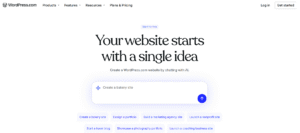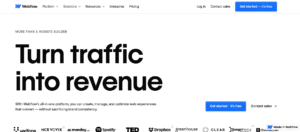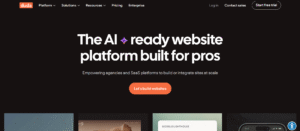Imagine spending months creating the perfect website with stunning visuals and incredible content, only to discover that nobody can find it on Google. This scenario happens thousands of times every day because business owners choose website builders without considering SEO impact.
Your website builder choice directly affects your search engine rankings. Some platforms create clean, fast-loading code that search engines love, while others generate bloated websites that get buried on page 10 of search results.
SEO serves as the bridge connecting your valuable content with people actively searching for your products or services. When someone searches for “best coffee shops near me” or “digital marketing agency,” search engines decide which websites deserve top positions based largely on technical factors controlled by your website builder.
The digital landscape has evolved significantly in 2025. Google’s Core Web Vitals now carry more weight in ranking decisions, requiring websites to load quickly and provide smooth user experiences. The EEAT framework (Experience, Expertise, Authoritativeness, Trustworthiness) means search engines better identify high-quality, trustworthy websites.
Additionally, AI and automation tools are revolutionizing SEO approaches. Modern website builders offer AI-powered optimization suggestions, automated meta tag generation, and smart content analysis features that previously required expensive tools or agencies.
However, the fundamentals remain unchanged: your website needs technically sound architecture, mobile-friendly design, and a foundation that search engines can easily crawl and understand. Choosing the right website builder is one of your most critical SEO decisions.
Top Website Builders Compared (SEO-Focused)
Quick Comparison Table
Before diving into detailed analysis, here’s how the leading website builders compare for essential SEO features:
| Platform | Meta Editing | XML Sitemaps | Schema Markup | Page Speed | Learning Curve | Best For |
|---|---|---|---|---|---|---|
| WordPress | Full Control | Yes (Plugins) | Excellent | Varies | Moderate-High | Blogs, Content Sites |
| Wix | Good | Automatic | Built-in | Good | Low | Small Business |
| Squarespace | Basic | Automatic | Limited | Good | Low | Portfolios, Creatives |
| Shopify | Good | Automatic | eCommerce Focus | Excellent | Moderate | Online Stores |
| Webflow | Full Control | Automatic | Excellent | Excellent | High | Agencies, Developers |
| Duda | Good | Automatic | Built-in | Excellent | Low-Moderate | Local SEO, SMBs |
1. WordPress (With SEO Plugins)

Best for: Complete customization and SEO control
WordPress powers over 40% of all websites globally, making it the platform search engines understand best. Its true SEO power emerges when combined with specialized plugins like Yoast SEO or Rank Math.
SEO Strengths:
WordPress paired with premium SEO plugins transforms into an optimization powerhouse. These plugins provide:
- Real-time content analysis with actionable optimization suggestions
- Advanced schema markup options for enhanced rich snippets
- Complete control over meta titles, descriptions, and Open Graph tags
- Automatic XML sitemap generation and search engine submission
- Internal linking suggestions and broken link monitoring
- Redirect management and canonical URL control
- Content readability analysis and keyword optimization guidance
The platform offers access to thousands of speed-optimized themes like GeneratePress and Astra, built with clean code and minimal bloat for excellent Core Web Vitals performance.
WordPress’s flexibility allows optimization of every technical SEO aspect. You can implement custom post types with specific schema markup, advanced caching strategies, and precisely what your SEO strategy requires.
Weaknesses:
The primary challenge is the learning curve. While WordPress itself is user-friendly, mastering SEO plugins and optimization techniques requires time investment. You’ll manage updates, security, and potential plugin conflicts.
Site speed varies dramatically based on hosting provider, theme choice, and plugin usage. Poorly optimized WordPress sites can perform slower than well-built sites on other platforms.
Ideal use case: WordPress excels for content-heavy websites, blogs, news sites, and businesses prioritizing organic search traffic. It’s perfect for digital marketing agencies managing multiple client sites and anyone wanting complete SEO control.
2. Wix
Best for: Beginners seeking SEO results without complexity
Wix has dramatically transformed its SEO capabilities, evolving from an SEO-unfriendly platform into a legitimate option for businesses serious about search rankings.
SEO Strengths:
The standout feature is Wix’s AI-powered SEO Wizard, which guides users through step-by-step optimization processes. It asks business-specific questions and automatically implements optimization strategies.
Key SEO advantages include:
- Automatic mobile optimization ensuring perfect display across all devices
- Built-in schema markup for local businesses, articles, and events
- Advanced SEO app with keyword tracking and site audit features
- Fast loading times via Wix’s global Content Delivery Network
- Automatic image optimization and lazy loading implementation
- Built-in social media integration for enhanced content distribution
- User-friendly interface requiring no technical knowledge
Wix handles technical SEO automatically. XML sitemaps generate and submit to search engines without user intervention. The platform creates clean URLs and implements proper heading structures by default.
Weaknesses:
Despite improvements, Wix doesn’t offer advanced customization options that SEO professionals might need. You cannot install third-party SEO plugins or make deep technical code modifications.
The app ecosystem remains more limited compared to WordPress, potentially creating barriers for advanced SEO strategies.
Ideal use case: Wix is perfect for local businesses, freelancers, and small companies wanting professional SEO results without becoming SEO experts. It’s especially effective for service-based businesses needing strong local search visibility.
3. Squarespace

Best for: Design-focused brands needing solid SEO fundamentals
Squarespace built its reputation on beautiful design while providing a solid foundation for SEO success. Though it may lack advanced features of WordPress or Webflow, it covers essentials extremely well.
SEO Strengths:
Squarespace’s greatest SEO advantage is its clean, semantic code. Every template is built with SEO best practices, creating websites that search engines easily crawl and understand.
Key SEO features include:
- Automatic XML sitemap generation and search engine submission
- Built-in mobile optimization across all templates
- Fast loading times with optimized image compression
- Clean URL structures and proper heading hierarchies
- SSL certificates included with all plans
- Integrated social sharing and Open Graph tags
- Responsive design ensuring excellent mobile performance
The platform automatically handles many technical SEO elements that might challenge beginners on other platforms. Image optimization occurs behind the scenes, and responsive design ensures strong mobile device performance.
Weaknesses:
Squarespace’s simplicity is both strength and weakness. While the platform handles SEO basics well, you’re limited with advanced optimization techniques. There’s no plugin ecosystem, and you cannot make deep technical SEO customizations.
Blogging features, while functional, aren’t as robust as WordPress offerings. This can limit content marketing potential, often crucial for long-term SEO success.
Ideal use case: Squarespace is ideal for creative professionals, photographers, designers, and small businesses prioritizing visual appeal while maintaining solid SEO performance. It’s perfect for portfolio sites and businesses where brand image is paramount.
4. Shopify

Best for: eCommerce websites needing to rank for product searches
For eCommerce SEO, Shopify stands out as the platform understanding online retail comprehensively. It’s built specifically for stores needing to rank for product-related searches and convert visitors into customers.
SEO Strengths:
Shopify excels at technical eCommerce SEO aspects:
- Lightning-fast loading times with optimized hosting infrastructure
- Automatic product schema markup for rich snippets in search results
- Built-in review systems generating valuable user-generated content
- Mobile-optimized checkout process improving user experience signals
- Automatic XML sitemaps for products, collections, and pages
- Clean URL structures optimized for product searches
- Integration with Google Shopping and comparison sites
The platform automatically generates structured data for products, helping them appear in Google Shopping results and rich snippets. This can dramatically increase click-through rates from search results.
Shopify’s app ecosystem includes powerful SEO tools like TinyIMG for image optimization, Plug in SEO for technical audits, and advanced schema markup implementations.
Weaknesses:
The main challenge is Shopify’s approach to content marketing. Blogging functionality is basic compared to WordPress, potentially limiting comprehensive content strategies that attract organic traffic.
Duplicate content can be problematic, as Shopify sometimes creates multiple URLs for identical products. While manageable, this requires ongoing attention to avoid SEO issues.
Ideal use case: Shopify is the clear winner for online stores, dropshipping businesses, and any company selling products online. It’s especially powerful for businesses wanting to integrate SEO strategy with sales funnel and conversion optimization efforts.
5. Webflow

Best for: Developers and agencies wanting design freedom with SEO power
Webflow represents the perfect marriage of design flexibility and SEO functionality. It’s like having custom-coded website power with visual website builder convenience.
SEO Strengths:
Webflow generates incredibly clean, semantic HTML that search engines love. The platform provides granular control over every SEO element:
- Complete control over meta titles, descriptions, and Open Graph tags
- Custom schema markup implementation without plugins
- Advanced 301 redirect management
- Automatic XML sitemap generation with customization options
- Built-in image optimization and WebP support
- Custom CMS with SEO-friendly dynamic content capabilities
- Clean code output rivaling hand-coded websites
The platform’s visual approach to web design doesn’t sacrifice technical SEO capabilities. You can implement complex schema markup, create custom meta tag templates, and optimize every aspect of your site’s technical foundation.
Webflow’s hosting infrastructure is speed-optimized, with global CDN distribution and automatic caching. Sites built on Webflow typically score excellently on Core Web Vitals assessments.
Weaknesses:
The learning curve is steep, especially for users from simpler platforms. Webflow’s power comes with complexity, and mastering both design interface and SEO features requires time investment.
Pricing can be higher than alternatives, especially for sites with complex CMS requirements or high traffic volumes.
Ideal use case: Webflow is perfect for digital agencies, startups with technical resources, and SEO professionals wanting complete website optimization control. It’s ideal for businesses viewing their website as a crucial competitive advantage and willing to invest in learning the platform.
6. Duda

Best for: Local SEO and agency workflows
Duda might not be as well-known as other platforms, but it’s quietly become a powerhouse for local SEO and agency-managed websites. The platform is specifically designed with SEO performance and client management in mind.
SEO Strengths:
Duda’s focus on page speed and local SEO makes it distinctive:
- Exceptional Core Web Vitals performance out of the box
- Built-in schema markup builder with local business focus
- AMP (Accelerated Mobile Pages) support for ultra-fast mobile loading
- Advanced image optimization with automatic WebP conversion
- Integrated local SEO tools for multi-location businesses
- White-label capabilities for agencies managing client SEO
- Automated technical SEO handling
The platform automatically handles many technical SEO tasks while providing control over elements most important for local search rankings. The schema builder is particularly impressive, allowing complex structured data implementation without coding knowledge.
Weaknesses:
Duda’s app ecosystem is more limited compared to WordPress or Shopify. While the platform covers SEO essentials extremely well, you might need alternatives for highly specialized functionality.
Content management features, while functional, aren’t as robust as content-focused platforms like WordPress.
Ideal use case: Duda excels for local businesses, service providers, and digital agencies managing multiple client websites. It’s particularly strong for businesses needing local search result rankings and wanting automatic technical SEO handling.
Essential SEO Features To Look For in a Website Builder
When choosing a website builder for SEO success, specific features separate platforms that will boost your search rankings from those that will limit your visibility. Here are the critical capabilities to prioritize.
1. On-Page Optimization Tools
On-page SEO provides your most direct control over search rankings. Your website builder should offer easy access to optimize elements that search engines use to understand your content.
Meta title and description editing: This is absolutely essential. You need the ability to customize title tags and meta descriptions for every page. These elements appear in search results and directly impact click-through rates. Look for builders that preview how pages will appear in search results and warn when titles or descriptions exceed character limits.
Image ALT tags and file names: Search engines cannot “see” images, so they rely on ALT tags to understand visual content. Your platform should make adding descriptive ALT tags to every image easy. Bonus points for platforms that automatically suggest ALT tags based on image content or allow bulk editing.
Header tag control (H1-H6): Proper heading structure helps search engines understand your content hierarchy. Your builder should provide complete control over heading tags and make creating logical content structures simple.
2. Technical SEO Tools
Technical SEO encompasses behind-the-scenes elements crucial for search engine visibility. The best website builders handle most technical SEO automatically while providing control when needed.
XML sitemap generation: XML sitemaps serve as roadmaps helping search engines discover and index all your pages. Your platform should automatically generate and update sitemaps as you add new content. Automatic submission to Google and Bing is even better.
Canonical tags to prevent duplicate content: Duplicate content can hurt search rankings. Canonical tags tell search engines which version of similar pages should be considered the “main” version. This is especially important for eCommerce sites or blogs with multiple categories.
301 redirects: When you change URLs or remove pages, you need to redirect visitors and search engines to new locations. Look for platforms making redirect management simple and preserving SEO value during site changes.
Robots.txt management: This file tells search engines which site parts to crawl and which to ignore. While most users won’t need to modify this file, having access is important for advanced SEO strategies.
3. Structured Data and Schema Markup
Structured data helps search engines understand your content better and can lead to rich snippets in search results – enhanced listings including ratings, prices, or additional information.
Support for JSON-LD: This is the preferred format for structured data implementation. The best platforms either automatically generate structured data or provide easy tools for adding it to your pages.
Product, Article, Local Business schema types: Different content types benefit from different structured data formats. eCommerce sites need product schema, blogs need article schema, and local businesses need local business schema.
4. Site Speed and Core Web Vitals
Page speed is a direct ranking factor, and Google’s Core Web Vitals have made site performance more important than ever. Your website builder’s approach to speed optimization can make or break SEO efforts.
Lightweight code and fast hosting: The platform should generate clean, efficient code and provide fast hosting infrastructure. Look for builders using Content Delivery Networks (CDNs) to serve your site from locations close to visitors.
Lazy loading and image compression: Images often cause slow loading times. Your platform should automatically compress images and implement lazy loading, which only loads images as visitors scroll down pages.
Optimized caching: Caching stores page versions so they don’t need generation from scratch for every visitor. This dramatically improves loading times, especially for content-heavy sites.
5. Mobile-Friendliness
With mobile-first indexing, Google primarily uses your site’s mobile version for ranking purposes. Mobile optimization isn’t optional – it’s essential.
Responsive themes or templates: Your site should automatically adapt to different screen sizes and devices. The best platforms make all templates responsive by default.
Mobile preview and editor: You should be able to preview and edit how your site looks on mobile devices. Some platforms allow mobile-specific customizations while keeping desktop versions unchanged.
6. AI and Automation for SEO
AI-powered SEO tools are becoming increasingly sophisticated and can save significant time while improving optimization efforts.
AI-generated meta tags and keyword suggestions: Some platforms can analyze your content and suggest optimized meta titles, descriptions, and relevant keywords. While you should review and customize these suggestions, they provide excellent starting points.
Automatic content optimization: Advanced AI tools can analyze your content for readability, keyword usage, and SEO best practices, providing real-time improvement suggestions.
Pricing Breakdown: SEO Features by Cost
Understanding the relationship between pricing and SEO features is crucial for making smart investments in your website platform. Here’s how SEO capabilities typically scale with different pricing tiers.
Free vs Paid Plans: SEO Limitations
Most website builders offer free plans, but these come with significant SEO limitations that can hurt search rankings:
Free plans typically restrict you to subdomains (like yoursite.wix.com), which look unprofessional and don’t build authority for your brand. You’ll also see limited or no Google Analytics integration, restricted meta tag editing, no SSL certificates (a ranking factor), and limited control over XML sitemaps.
The jump from free to the lowest paid tier usually unlocks custom domains, basic SSL certificates, Google Analytics integration, and fundamental meta tag editing capabilities. For most businesses serious about SEO, this upgrade is essential.
WordPress: Plugin-Dependent Costs
WordPress itself is free, but achieving full SEO potential requires investments in hosting, premium themes, and plugins:
- Quality hosting: $10-50/month for SEO-optimized performance
- Premium SEO plugins: $0-200/year (Yoast Premium, Rank Math Pro)
- Fast, SEO-friendly themes: $50-150 one-time purchase
- Additional SEO tools: $20-100/month for advanced features
Total monthly cost for professional WordPress SEO setup: $30-150/month
Wix: Built-in SEO Scaling
Wix’s SEO features improve significantly as you move up pricing tiers:
- Connect Domain ($14/month): Custom domain, basic SEO tools
- Combo ($18/month): Adds Google Analytics, more storage
- Unlimited ($23/month): Unlimited bandwidth, Site Booster app
- Pro ($27/month): Professional logo, social media logos
- VIP ($35/month): Priority support, professional site review
Most small businesses find the Unlimited plan offers the best SEO value.
Best Value for SEO by Budget Level
Under $25/month: Wix Unlimited or Duda Basic offer the best built-in SEO features without requiring additional plugins or tools.
$25-75/month: WordPress with quality hosting and premium SEO plugins provides the most comprehensive SEO capabilities and growth potential.
$75-150/month: Webflow or Shopify (depending on your needs) offer professional-grade SEO features with excellent performance and scalability.
Over $150/month: Enterprise solutions or multiple WordPress sites with full SEO tool stacks for agencies and large businesses.
Best Website Builder by Website Type
Choosing the right website builder isn’t just about SEO features – it’s about finding the platform that aligns with your specific business model and goals. Here’s how to match your website type with the builder that will deliver the best SEO results.
Blogs: WordPress or Webflow
For content-focused websites, WordPress remains the gold standard. The platform’s extensive plugin ecosystem, SEO-friendly themes, and content management capabilities make it perfect for blogs wanting to grow through organic search.
WordPress excels for blogs because it offers unlimited customization options for content organization, comprehensive SEO plugins like Yoast and Rank Math, extensive theme options optimized for readability and speed, and powerful content scheduling and management tools.
Webflow is the premium alternative for blogs prioritizing design flexibility alongside SEO power. It’s perfect for content creators wanting their blog to stand out visually while maintaining technical SEO excellence.
Local Businesses: Wix or Duda
Local businesses have specific SEO needs differing from national or international companies. They need to rank for location-specific searches and integrate with local business directories and review platforms.
Wix’s local SEO strengths include built-in local business schema markup, Google My Business integration, location-specific SEO wizard guidance, and mobile optimization for local search behavior.
Duda offers similar local SEO benefits with additional features for multi-location businesses, including advanced local schema markup options, white-label capabilities for agencies managing multiple locations, and exceptional mobile performance for local search.
Online Stores: Shopify
For eCommerce SEO, Shopify’s specialized focus on online retail makes it the clear winner. The platform understands unique SEO challenges of product-based websites and provides tools specifically designed for online stores.
Shopify’s eCommerce SEO advantages include automatic product schema markup for rich snippets, optimized product page templates, integration with shopping comparison sites, built-in inventory management preventing SEO issues, and mobile-optimized checkout processes improving user experience signals.
Portfolios: Squarespace
Creative professionals need websites showcasing their work beautifully while remaining discoverable through search engines. Squarespace strikes the perfect balance between visual appeal and SEO functionality.
Squarespace works well for portfolios because it offers stunning visual templates that don’t sacrifice SEO, automatic image optimization for faster loading, clean code that search engines easily crawl, and integrated social sharing for broader content distribution.
Agencies: Webflow or WordPress
Digital agencies need platforms that can scale across multiple clients while providing flexibility to implement advanced SEO strategies for diverse business types.
WordPress offers unlimited customization options for diverse client needs, extensive plugin ecosystem for specialized requirements, white-label capabilities for agency branding, and cost-effective scaling for multiple sites.
Webflow provides advanced design capabilities without coding requirements, built-in SEO optimization that impresses clients, professional hosting infrastructure, and collaborative features for agency teams.
Conclusion
Choosing the right website builder for SEO success isn’t about finding the “perfect” platform – it’s about finding the platform that best matches your specific needs, technical comfort level, and business goals.
Choose a website builder that supports creating valuable content, ensuring excellent user experience, and making it easy for search engines to find and understand your pages. With the right foundation, you’ll be well-positioned for search success in 2025 and beyond.


